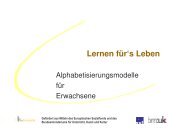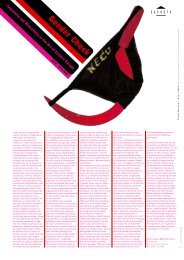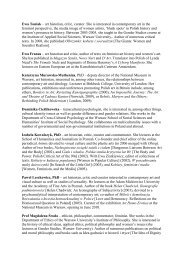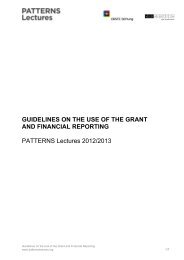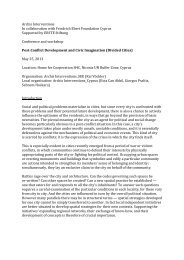DIE ERSTE österreichische Spar-Casse ... - ERSTE Stiftung
DIE ERSTE österreichische Spar-Casse ... - ERSTE Stiftung
DIE ERSTE österreichische Spar-Casse ... - ERSTE Stiftung
You also want an ePaper? Increase the reach of your titles
YUMPU automatically turns print PDFs into web optimized ePapers that Google loves.
Income taxation of Notes purchased after 31 March 2012<br />
With the passing of the Budget Accompanying Act of 2011, the Austrian legislator intends to<br />
comprehensively realign the taxation of financial instruments, in particular with regard to<br />
capital gains. Pursuant to the newly worded sec. 27(1) of the Austrian Income Tax Act, the<br />
term investment income (Einkünfte aus Kapitalvermögen) comprises:<br />
� income from the letting of capital (Einkünfte aus der Überlassung von Kapital) pursuant to<br />
sec. 27(2) of the Austrian Income Tax Act, including dividends and interest on bonds;<br />
� income from realised increases in value (Einkünfte aus realisierten Wertsteigerungen)<br />
pursuant to sec. 27(3) of the Austrian Income Tax Act, including gains from the sale,<br />
redemption and other realisation of assets that lead to income from the letting of capital<br />
(as well as the balance between the redemption price and the issue price in case of zero<br />
coupon bonds), and also broken-period interest; and<br />
� income from derivatives (Einkünfte aus Derivaten) pursuant to sec. 27(4) of the Austrian<br />
Income Tax Act, including cash settlements, option premiums received and income from<br />
the sale or other realisation of forward contracts like options, futures and swaps and other<br />
derivatives such as index certificates.<br />
Also the withdrawal of Notes from bank deposits (Depotentnahme) is considered as a<br />
realisation of assets; however, no taxation is triggered if certain disclosures are made.<br />
Individuals subject to unlimited income tax liability in Austria holding Notes as a non-business<br />
asset are subject to income tax on all resulting investment income pursuant to sec. 27(1) of<br />
the Austrian Income Tax Act. In case of investment income with an Austrian nexus<br />
(inländische Einkünfte aus Kapitalvermögen), basically meaning income that is paid by an<br />
Austrian paying agent (auszahlende Stelle) or an Austrian custodian agent (depotführende<br />
Stelle), the income is subject to a withholding tax of 25%; no additional income tax is levied<br />
over and above the amount of tax withheld (final taxation pursuant to sec. 97(1) of the<br />
Austrian Income Tax Act). In case of investment income without an Austrian nexus, the<br />
income must be included in the income tax return; in this case it is subject to a flat income tax<br />
rate of 25%. Special rules apply for bonds that have not been legally and factually offered to<br />
an indefinite number of persons. Here, the investment income will in no case be subject to a<br />
withholding tax, but will always have to be included in the income tax return (marginal rate of<br />
up to 50%). Certain restrictions apply regarding the offsetting of losses.<br />
Individuals subject to unlimited income tax liability in Austria holding Notes as a business<br />
asset are subject to income tax on all resulting investment income pursuant to sec. 27(1) of<br />
the Austrian Income Tax Act. In case of investment income with an Austrian nexus (as<br />
described above) the income is subject to a withholding tax of 25%. While this withholding tax<br />
has the effect of final taxation for income from the letting of capital, income from realised<br />
increases in value and income from derivatives must on the other hand be included in the<br />
income tax return (nevertheless flat income tax rate of 25%). In case of investment income<br />
without an Austrian nexus, the income must always be included in the income tax return (flat<br />
income tax rate of 25%). Special rules apply for bonds that have not been legally and factually<br />
offered to an indefinite number of persons. Here, the investment income will in no case be<br />
subject to a withholding tax, but will always have to be included in the income tax return<br />
(marginal rate of up to 50%). Certain restrictions apply regarding the offsetting of losses.<br />
Corporations subject to unlimited corporate income tax liability in Austria are subject to<br />
corporate income tax on all investment income resulting from Notes at a rate of 25%. In case<br />
of investment income with an Austrian nexus (as described above) the income is subject to a<br />
withholding tax of 25%, which can be credited against the corporate income tax liability.<br />
However, under the conditions set forth in sec. 94(5) of the Austrian Income Tax Act no<br />
withholding tax is levied in the first place.<br />
Page 76



